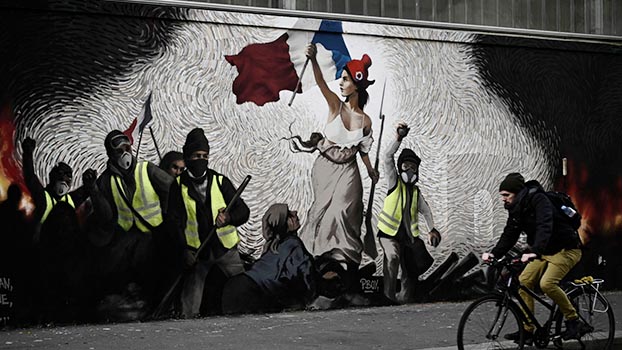How to make sure climate war doesn’t become class warfare
The EU’s crackdown on fossil fuels needs redistribution, innovation and investment to avoid a rerun of the Gilets Jaunes

Trade in coal and steel powered the European Union’s formative years. Now the bloc wants to lead the world on climate responsibility, with a bumper package of proposals from expanding an emissions-trading system to banning fossil fuel cars to reach its 2050 target of carbon neutrality. But for all the aspirational visions, there are justified jitters that the European project’s original stakeholders as cited by Jean Monnet — the “miner in his pit, the steelworker in his steelworks and the broad ranks of consumers” — will get left behind in the process.
Change is going to be “bloody hard,” as Frans Timmermans — the EU’s top official for climate policy — puts it, but even more so for those at the lower end of the income scale. Policies designed to raise the price of carbon and prod consumers towards lower emissions will affect everything from the price of flights to the cost of home heating bills. According to the EU’s own impact assessment, these are “significantly” bigger proportional costs for lower-income earners, who ironically are estimated to be among the least to blame for carbon pollution added to the atmosphere since 1990.
Livelihoods are also on the line. Even if a zero-emissions future promises new opportunities in sectors like electric cars or energy-efficient construction, it destroys carbon-intensive jobs along the way. The EU’s impact assessment estimates a total loss of 494 000 jobs by 2030 in aggregate; this may not sound like much, but, given these would be concentrated in sectors like coal, it’s entire regions that face a hit. The impact of the electric transition has already visibly hit the automotive sector, which accounts for almost 3 million manufacturing jobs in Europe.
The talk is already turning to how best to soften the blow, just as a lengthy haggling process over policy compromises between political parties and member states gets underway. French Green Party politician Pascal Canfin is warning of a potential return of the Gilets Jaunes, the French protest movement sparked in part by a 2018 rise in diesel taxes.
One obvious way to curb the Schumpeterian creative destruction unleashed by sweeping climate rules is by redistributing cash to the vulnerable. The EU has announced a social climate fund to go with its policy proposals, amounting to around 72 billion euros over seven years, financed by 25% of the proceeds from emissions trading for building and road transport fuels. That’s not too far from the 33% figure proposed last year by Vivid Economics in a paper sketching out how to mitigate the effects of a potential carbon tax. Christian Gollier of the Toulouse School of Economics reckons handouts to low-wage earners and a cut in national-insurance contributions would increase support for climate action.
This won’t on its own eradicate the optics of charging higher prices to those who can least afford it, though. Nor will it soothe the pain for those whose jobs are set to become obsolete in the coming years.
Going Green
Energy transition plans backed by capital markets could hit $1 trillion annually
One additional policy lever to consider is retraining and reskilling Europe’s vulnerable workforce, something that has yet to receive the financial backing and logistical resources it deserves. Past attempts by the EU to retrain unemployed workers via a “Globalization Adjustment Fund” have had mixed success, largely because of its small size and restrictive criteria. The climate-policy package should encourage bigger and bolder moves, especially given the EU’s ambition to re-shore jobs and encourage investment in sectors like electric-car batteries and semiconductors.
Another is innovation and investment, which would avoid the pitfalls of having governments pick winners over the next decade (which hasn’t worked out well thus far). The double win here will be bringing down the price for consumers of shifting away from carbon-intensive activities — the “green premium”, as BlackRock Inc. boss Larry Fink recently called it — and creating jobs in the process.
This isn’t going to happen in a vacuum, and will require tools to incentivize the private sector. One encouraging idea is “transition bonds,” a new type of debt offered by companies to help finance efforts to reduce emissions. As of May, these fundraisings had got off to a slow start, and the absence of clear standards raised concerns over “transition-washing” — the overstatement of commitments to tackling climate change. But there’s still plenty of optimism that transition finance could contribute as much as $1 trillion to the estimated $3 trillion needed annually to hit climate targets by 2050. After the miner in his pit, the steelworker in his steelworks and the consumer, the bond investor could be the barometer of the EU’s climate future.
Lionel Laurent is a Bloomberg Opinion columnist covering the European Union and France. He worked previously at Reuters and Forbes



